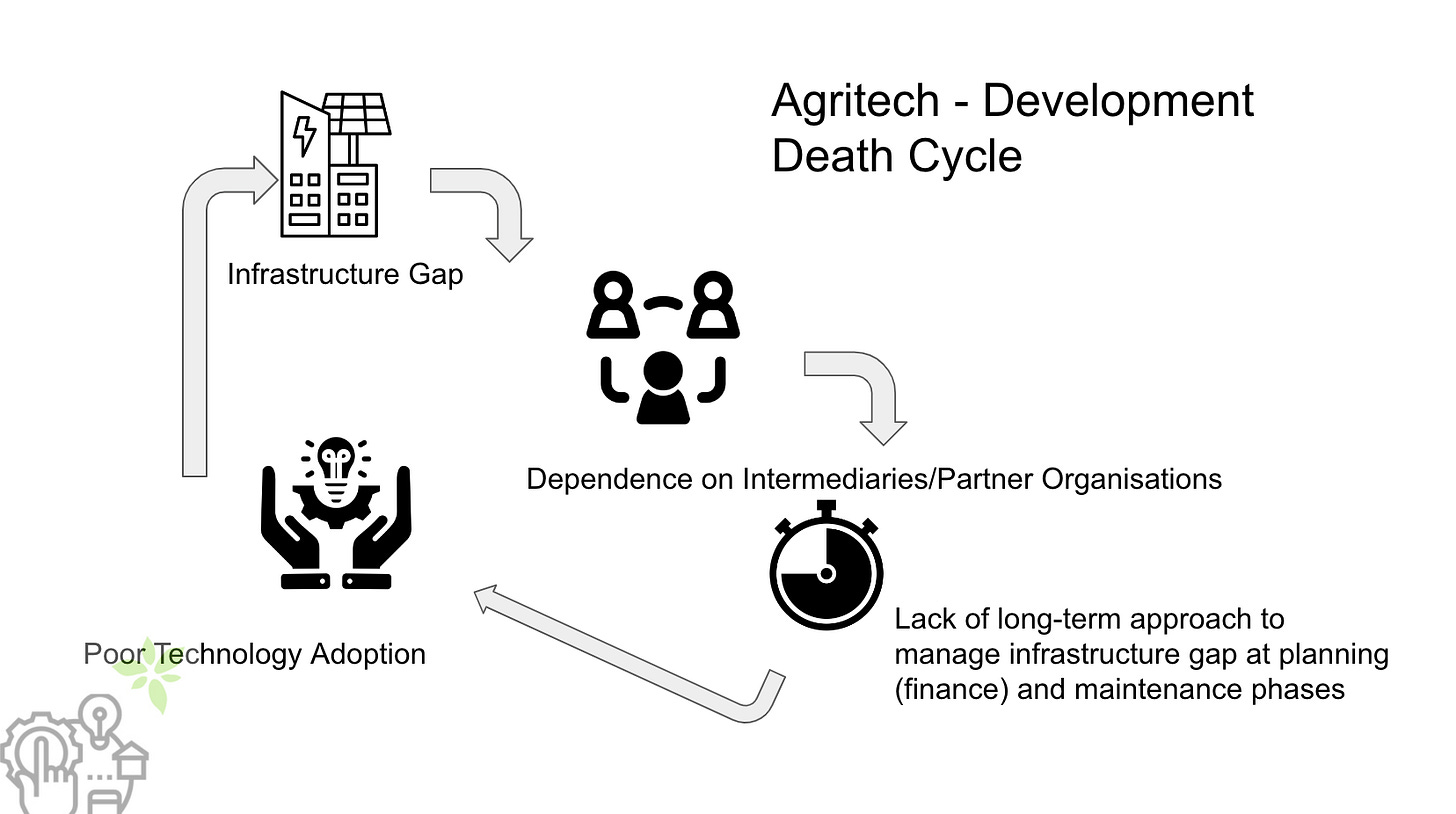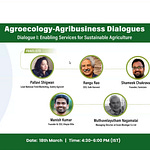Few weeks back, when I wrote about the ground-level challenges involved in Bayer<>Cargill partnership, I sketched out the Agritech-Development Death Cycle.
The hardest part in making agritech solutions work for smallholding contexts (and escaping the agritech-development death cycle) lies in collectivization when you attempt to crack economies of scale against all odds.
If you ask me, two trajectories of collectivisation are currently at play in India.
1) Corporate FPOs in states like UP, Odisha, West Bengal, Chattisgarh, and Jharkhand, especially in rainfed farmer contexts.
2) Industrial Agriculture in states like Telangana, Andhra Pradesh, Maharashtra, and Karnataka, especially in irrigated tenant farmer contexts.
How will these trajectories of collectivization play out? Would they subsume into each other? Or, given the complexity of land reforms in India and smallholding contexts, can we expect both these trajectories to evolve in consonance with the dynamics of their respective contexts?
Historically speaking, Corporate FPOs are a tricky subject in a country like India where we’ve seen the nexus between corporations and FPOs often discussed in profane terms. Historically, corporations have been wary of farmer collectives and farmer collectives have treated NGOs as partners and corporations as adversaries
In such a scenario, how do we strategise building corporate FPOs?
In my recent podcast conversation with Ravishankar Natarajan, he spelt out an epiphanic insight: If we are serious about building corporate FPOs, the point is to flip the frame and start strategizing for FPOs as corporations.
Ravishankar started his agribusiness journey in 1980, five years before I was born, and brings a breath of fresh air of optimism that belies his white hair and thirty-five years of agribusiness experience.
In his most recent avatar, along with other agribusiness veterans, he founded FPO Market Linkages Foundation which aims to institutionalize an operating Build-Operate-Train-Transfer model to build corporate FPOs.
Few weeks back, he wrote a detailed paper on the same and I invited him to a podcast to discuss his paper in detail and explore the question of building corporate FPOs in Indian market conditions.
What excited me to invite him to the podcast was precisely this paper: It was a fairly concise step-wise approach to building Corporate FPOs and more importantly how to enable FPOs to access capital markets and explore mutual funds to explore investing in Joint Ventures of market-facing apex FPOs.
In this podcast, we discussed
How does Ravishankar see the evolution of agribusiness from 1980 to 2023?
Why is it difficult to enforce safeguards in a domain like agriculture (Bonus Case Study: How Bt Cotton suffered with no mechanisms to enforce safeguards?)
Why is it important for regulators to enforce fair trade norms in agriculture?
Why do we see more anti-India bias among global agribusiness professionals and why we don’t see AMUL outside milk?
Why are FPOs so caught up with an undue focus on capacity building and the limitations of farmer training?
How can we bridge the organisational structure of cooperatives in line with FPOs? What is the limiting constraint for FPOs in becoming corporations?
What went behind Kurien’s vision of letting farmers remain producers and bring professionals to run agribusinesses?
Why have the outcome expectations changed for FPOs in comparison with farmer cooperatives?
BOTT Model and the importance of viability gap funding in building corporate-focused apex FPOs.
Collectivisation as a solution to prevent fragmentation of lands in smallholding contexts.
Why Ravishankar created a non-profit Section-8 firm ‘FPO Market Linkages Foundation’?
Ownership Vs. Management Debate in an FPO Context.
Why do we need SEBI equivalent in agricultural markets? How can we change the auction process in traditional agricultural markets?
I hope you enjoy the conversation as much as I did.
So, what do you think?
How happy are you with today’s edition? I would love to get your candid feedback. Your feedback will be anonymous. Two questions. 1 Minute. Thanks.🙏
💗 If you like “Agribusiness Matters”, please click on Like at the bottom and share it with your friend.














